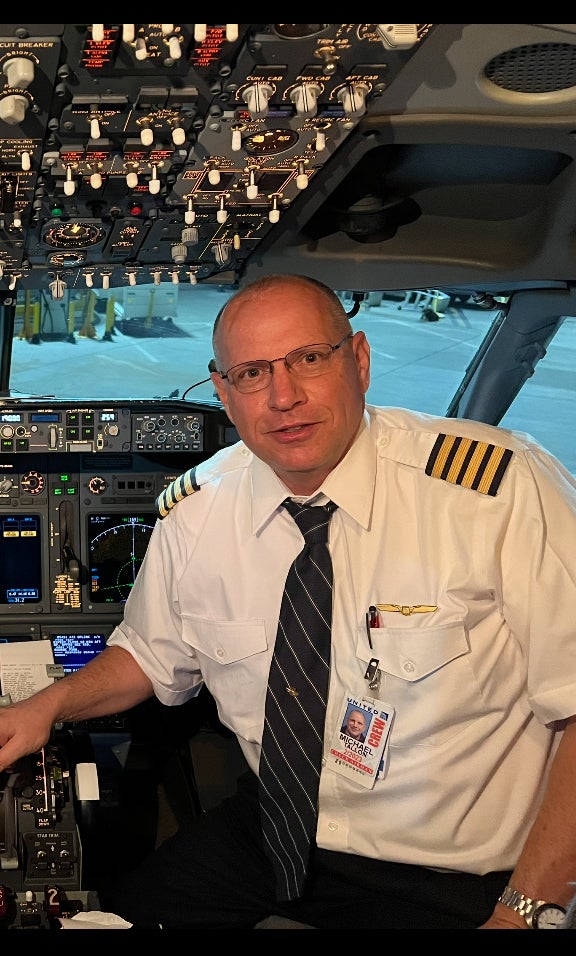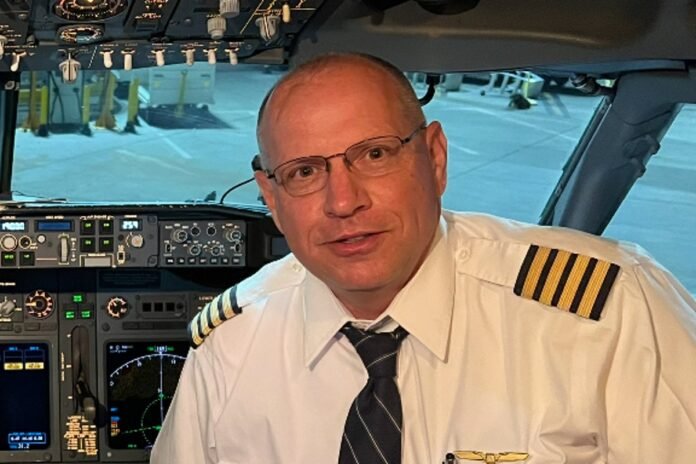A senior United Airlines pilot who was disoriented and slurring his speech following a head injury claims he was instead accused of being an alcoholic, forced into inpatient rehab and threatened with grounding unless he admitted to an allegedly nonexistent addiction.
When Capt. Michael Tallon denied he had troubles with alcohol, he was informed by higher-ups that “if he did not confess to having a drinking problem, he would ‘never fly a United plane again,’” according to a bombshell federal lawsuit obtained by The Independent.
Once he begrudgingly checked into residential treatment, Tallon, 56, was “subjected to repetitive and intrusive group therapies focused exclusively on alcohol use, abuse and dependence,” his complaint states, adding, “None of these were appropriate given [Tallon’s] actual medical condition – a head injury.”
After his release, the complaint says Tallon showed up dutifully for daily Alcoholics Anonymous meetings and blew into a breathalyzer twice a day, among other things, in order to comply with United’s demands. Upon presenting a second opinion from his personal physician who reported finding no evidence at all of any substance use disorder, United sent Tallon to a psychologist to deal with his “denial” issues, according to the complaint.
United, Tallon’s complaint alleges, “failed to provide reasonable accommodations for [Tallon’s] actual condition – post-concussion syndrome – while simultaneously subjecting him to burdensome and discriminatory treatment requirements for a condition he did not have.”
Nearly two years later, Tallon was fired for refusing to keep up the charade, according to the complaint.
“I can’t believe it, still,” Tallon told The Independent. “… If I thought I had cancer but five doctors told me I didn’t, would you fire me for refusing chemotherapy?”

Tallon, a “check airman” who trained and evaluated pilots flying United’s 737 fleet, had nearly three decades of experience and was earning more than $400,000 when he was terminated. He said he has never been a big drinker, that everyone he worked with knew he might go out for “a beer or two, and that’s it.”
“I didn’t want to sue anybody, I just wanted to go back to work,” Tallon said. “Finally, I just had enough. I decided to stand up. I can’t admit to something I’m not, just to get my paycheck.”
Attorney Mike Lueder, who is representing Tallon in his suit against United, described what happened to his client as “draconian.”
“If you’re not someone who is actually in recovery, to have to sit there and go through an AA program, or inpatient treatment, or have a peer pilot looking over your shoulder, it’s Kafkaesque,” Lueder told The Independent. “It’s craziness.”
In an email on Tuesday, a United Airlines spokesperson said, “Since this is an ongoing legal matter, we won’t have anything to share.”
Tallon’s saga began on June 10, 2023, while on a layover in the Azores in the mid-Atlantic, according to his complaint, which was filed July 3 in Chicago federal court.
“He tripped on an uneven cobblestone walk and fell to the ground, sustaining visible facial lacerations and concussion symptoms,” it states. “Following the fall, [Tallon’s co-pilot] observed [his] deteriorating speech and confusion. [Tallon] returned to his hotel room to rest, but his head injury worsened.”
Tallon “became concerned that he would not be safe to fly the next day,” and called a United manager to remove himself from the schedule, the complaint goes on. It says the United manager then called Tallon’s co-pilot and asked if Tallon had been drunk at the time of his fall. The co-pilot said no, that Tallon “was not intoxicated but might have a concussion,” according to the complaint.

Tallon told The Independent that he told the United manager he’d had a drink with his dinner, which apparently set off alarm bells.
“Despite clear and reported signs of head trauma, the United manager failed to provide or suggest that [Tallon] seek immediate medical attention, at one of the three local English-speaking Emergency Care providers, as required by United’s own procedures for crew member injuries while on duty or on layovers,” the complaint continues.
At this point, a “distracted and confused” Tallon called his wife and asked her to let him speak with his mother, the complaint says. She immediately knew something was wrong, as Tallon’s mom had died some 20 years earlier, the complaint explains.
Tallon also spoke with his union rep from the Air Line Pilots Association, who was also the chair of the steering committee for United’s substance-abuse recovery program.
In what the complaint calls Tallon’s “concussed fog,” he told the union rep that “he needed help with his drinking in response to her leading questions on the topic,” the complaint states, noting that Tallon “does not have a complete recollection of this conversation.”
Tallon flew home to the U.S. the next day as a passenger on the flight he was originally supposed to pilot, according to the complaint. It says that while the plane was in the air, Tallon’s union rep arranged – “without [Tallon’s] knowledge or permission” – for him to attend inpatient alcohol treatment. When Tallon landed, he got a call from United and association officials, who “immediately pressured him to admit to alcoholism,” the complaint states.
Shocked, Tallon denied he had a problem with alcohol, the complaint continues. However, it contends, the rep informed Tallon that if he didn’t admit he was an alcoholic and go to rehab, he would lose his job.
In the meantime, Tallon challenged United’s assessment and met with a physician working for the carrier, who tested him for drugs and alcohol as part of a fitness-for-duty evaluation, the complaint states. Tallon came up clean, it maintains. Nevertheless, United’s doctor issued a report saying “he believed [Tallon] was alcohol dependent,” the complaint alleges.
But, this was merely an “opinion,” not an actual diagnosis, according to the complaint, which claims the doctor ignored, among other things, Tallon’s lab results, professional evaluations, and, most importantly, his untreated head injury. So, Tallon decided to seek out a second doctor, as is his right under the union’s contract with United, the complaint says. Yet, this prompted a warning from an association lawyer, who told Tallon that doing so would “be an insult” to the United doctor, and “would suggest ‘denial,’” the complaint asserts.
.jpeg)
On August 28, 2023, Tallon was sent to a recovery center in Connecticut, where clinicians puzzled over his lack of an actual diagnosis, the complaint states. A little less than a month later, United and association officials pressured Tallon to sign himself up for “HIMS,” or, “Human Intervention Motivation Study,” which is the aviation industry’s standard substance-abuse recovery program, according to the complaint.
“Under coercion and duress, Plaintiff signed the HIMS contract on September 21, 2023,” the complaint says.
In response to a request for comment from The Independent, an ALPA representative said it is the organization’s policy “to refrain from commenting on ongoing legal matters.”
Four days later, the recovery center discharged Tallon with a finding of “no diagnosis,” according to the complaint. Tallon went to see his primary care physician, who was “shocked” he hadn’t yet been given a full head trauma evaluation for his fall and found no indication of alcoholism, the complaint states.
Tallon continued to protest United’s insistence that he was an alcoholic, telling his bosses that having to pretend to have a drinking problem in order to stay employed was “not appropriate,” the complaint states. Yet, United’s Employee Assistance Program rep let Tallon know, in no uncertain terms, “If I hear you say one more time that you are NOT in recovery, you will be out of compliance with the program,” the complaint alleges.
So, Tallon completed 90 consecutive days of an intensive outpatient program, according to the complaint. There, Tallon’s therapist joined the chorus of other professionals who did not view Tallon as an alcoholic. Tallon’s AA sponsor also agreed that Tallon didn’t have a drinking problem, the complaint says. In early 2024, Tallon began an aftercare program at the Connecticut rehab, where, after five months of treatment, yet another counselor said he didn’t see any signs of alcoholism or a history of hard drinking, according to the complaint.
Still, a physician under contract to United as an Air Medical Examiner demanded Tallon now undergo neuropsychological testing for alcoholism, the complaint states. The doctor performing the test told Tallon that she was confused, as, “You have not been diagnosed with anything,” according to the complaint.
It says the doctor then cut short the session, and sent Tallon home. This, according to the complaint, led United’s Air Medical Examiner to insist Tallon see a psychologist for “treatment of ‘anxiety and denial of (alleged) alcoholism,’” the complaint states. But, it contends, the psychologist saw no signs that Tallon was an alcoholic, and said so in an April 2024 report. Regardless, United demanded Tallon reschedule the neurocognitive test, according to the complaint.
This time, Tallon refused.
“He had sent reams of information to United confirming that he was not alcoholic and was finished with the nonsense,” the complaint states.
In February 2025, after a hearing, United fired Tallon “because he allegedly would not comply with the HIMS program,” according to the complaint. It says that by getting rid of Tallon via the HIMS program, rather than a medical separation due to his head injury, meant United saved itself millions in long-term disability payments.
“It’s a sh***y system,” Lueder told The Independent, “and I hope to help change it.”
Tallon is now seeking compensatory damages for lost wages and benefits, emotional distress, and reputational harm, punitive damages and an injunction forcing United to rework the HIMS program, plus attorneys’ fees and court costs.
“I have no other choice but to look back and laugh,” Tallon said on Tuesday. “But here I am, and I’m moving on with my life.”


























